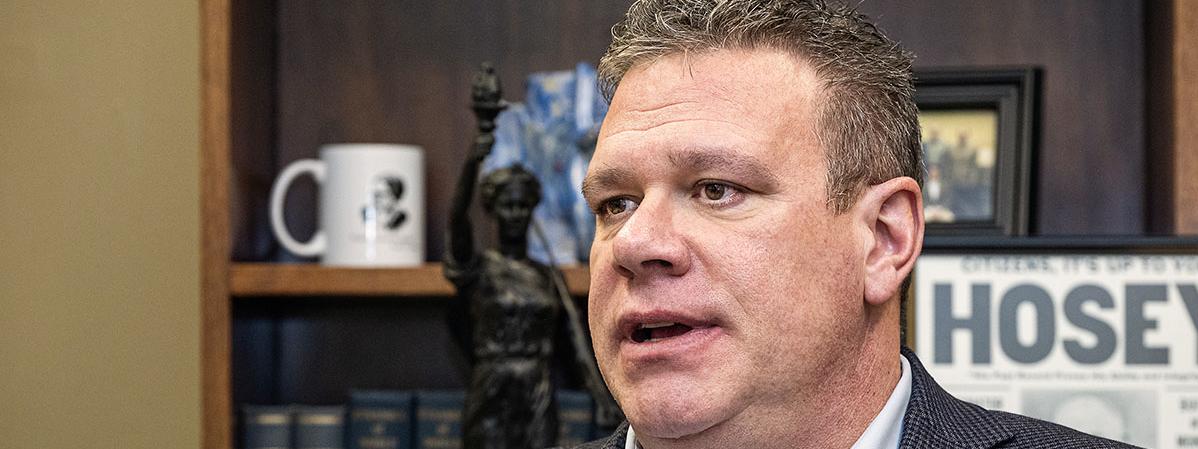
Wolf kept busy representing Mike Downs Center for Indiana Politics
By Blake Sebring
March 21, 2024
Throughout 2024, Purdue University Fort Wayne’s Mike Wolf has one of Indiana's toughest jobs . During a presidential election year that happens to include high-profile contests state-wide and coast to coast, how does Wolf take the politics out of talking about politics? How does he make all the discussion points relatable to citizens who can simultaneously curse partisanship while being totally driven by it?
As interim director of the Mike Downs Center for Indiana Politics in the College of Liberal Arts, along with being chair of the Department of Political Science, Wolf will be asked to participate in several weekly interviews to help interpret political news for local, state, and national media looking for perspective. During a recent week—though more than seven months away from the general election—Wolf gave four interviews.
“We do multiple goals,” Wolf said while sitting in the center’s designated space in room 214 of the Liberal Arts Building. “It’s a nonpartisan center devoted to helping the people of Indiana understand the wide-ranging impact of politics on their daily lives.”
Fulfilling Mike Downs’ dream, the center is open to scholars, students, politicians, and everyday citizens seeking better understanding of local politics and government.
Downs served PFW for 34 years as a professor and department chair before he passed away in 2001. First of its kind in the country, the center started in 2002 with his son Andy serving as director until 2022, when he left to pursue other public service opportunities. After being involved for all 20 years as a board member, Wolf stepped in.
Andy Downs conducted more than 2,000 interviews during his time, and Wolf said they take up about 20% of his calendar, usually focused on state issues, local government, and elections. Often, interviews come from national and even international media looking for local perspectives on national events.
But the center also serves several other functions, including working with the university’s political science classes to teach public policy, political history, and research for nonprofits. Potential candidates can also ask for unbiased advice about running for office.
There are also polls to conduct, working with national partners deliberating on public issues, and facilitating local- and state-focused panel discussions. Recently, the center led an urban vs. rural polarization discussion and organized an Indianapolis panel before the opening of Indiana’s current legislative session. A Fort Wayne gathering several years back examined local citizens’ feelings about the public/private financing balance of Electric Works.
One of Wolf’s favorite activities is working with student interns, many of whom advance to national public policy organizations. Wolf also works closely with several of PFW’s other Centers of Excellence, such as the Center for Collaborative Media in the College of Liberal Arts, the Center for Applied Mathematics and Statistics in the College of Science, and the Community Research Institute in the Doermer School of Business. As an example, mathematics and statistics examine polling data sponsored by the Downs Center.
“I think the idea of the Centers of Excellence is that we support each other,” Wolf said. “They need programming, and it works out tremendously. It’s cool to take advantage of the university’s investment to help make those areas that much better.”
The partnerships are mutually beneficial.
“I found the Mike Downs Center for Indiana Politics to be a trusted nonpartisan voice in a very noisy space long before I started at the university in 2017,” said Rachel Blakeman, director of the Community Research Institute. “In my work at CRI, I have had the opportunity to collaborate with the Mike Downs Center multiple times and got a better result for our clients.”
The center also maintains a collection of political memorabilia like yard signs, convention hats, and campaign pins. A custom necktie from former Vice President Dan Quayle, an Indiana native who also served in the U.S. House of Representatives and Senate, is the most unique item. Program assistant Michael Gerardot, B.A. ’22, is organizing the correspondence of 30-year state Senator Thomas Wyss, B.A. ’76, for Public History course student projects.
The center’s agenda and calendar are busy, but the main focus is providing information and clarity to the public.
“These days, it’s an irony that we have more technology and more information, and people are more educated than they have ever been, and the politics is in people’s faces,” Wolf said, “yet it is seemingly more and more removed. The center represents the idea of taking the political impact and making it more present. There need to be more institutions like the Mike Downs Center that connect people to politics, and to the community, that provide the capacity to help guide elected officials, too.”




